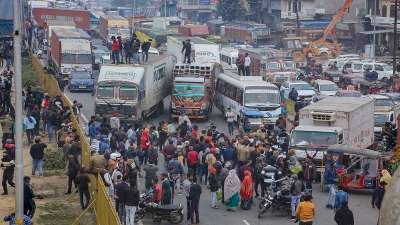
A looming crisis in fuel and essential items has been averted as the countrywide agitation by truckers, cab drivers, and operators of commercial vehicles has come to a halt following government assurances. The All-India Motor Transport Congress (AIMTC) has called off the protest after extended discussions with the government regarding the contentious Section 106(2) of the Bharatiya Nyaya Samhita (BNS), slated to replace the colonial-era Indian Penal Code.
The primary bone of contention for the truckers was the stringent penalties outlined in Section 106(2) for hit-and-run cases. Concerns about the feasibility of paying hefty fines in the event of accidents, alongside apprehensions about the law’s potential misuse, fueled the agitation, raising alarm about a potential shortage of fuel and essential items due to the threatened nationwide strike.
However, after deliberations with representatives from the All-India Motor Transport Congress, the government has assured stakeholders that the new rule has not yet been enforced. Union Home Secretary Ajay Bhalla emphasized the government’s commitment to consult with AIMTC representatives before implementing the BNS 106/2.
“The new laws have not been implemented. It will be implemented only after consultation with All India Transport Congress,” confirmed Bal Malkit, chairman of the AIMTC’s core committee.
The discussions between the government and transport representatives have centered on the potential impact of the law, emphasizing concerns about the process of informing authorities after an accident, the risk of public backlash, and the admissibility of evidence in case of disputes.
Experts have cautioned against potential misuses of the law and the challenges associated with meeting the stringent requirements outlined in Section 106(2), adding weight to the demand for thorough consultations before its implementation.
The resolution of this standoff has alleviated immediate fears of a nationwide fuel shortage and disruption in essential services. It stands as a testament to the power of dialogue and consultation in addressing contentious issues that impact multiple sectors and the general populace.
As stakeholders continue discussions and deliberations on the future course of action regarding the BNS 106/2, the nation remains cautiously optimistic about a balanced resolution that ensures both road safety and fair treatment for commercial vehicle operators.
Sources By Agencies

